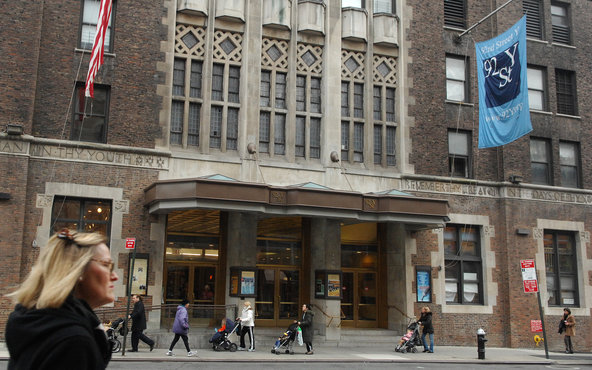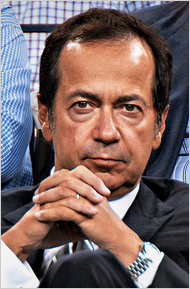 Jennifer S. Altman for The New York TimesThe 92nd Street Y, an Upper East Side cultural institution, has some unusual insurance against the market’s vagaries.
Jennifer S. Altman for The New York TimesThe 92nd Street Y, an Upper East Side cultural institution, has some unusual insurance against the market’s vagaries. Rick Maiman/Bloomberg NewsJohn A. Paulson has guaranteed the 92nd Street Y against losses.
Rick Maiman/Bloomberg NewsJohn A. Paulson has guaranteed the 92nd Street Y against losses.
Clients of John A. Paulson, the billionaire hedge fund manager, have had a brutal year, absorbing losses of as much as 50 percent.
But one of Mr. Paulson’s investors — the 92nd Street Y — has nothing to worry about.
That’s because Mr. Paulson, a member of the organization’s board, has guaranteed he will cover the Y for any losses it incurs in his funds. Barring a sharp recovery, Mr. Paulson will have to write a personal check to the organization for several million dollars.
“This is a very uncommon arrangement,” said Andrew M. Grumet, a lawyer specializing in philanthropy. “But the 92nd Street Y isn’t your average nonprofit, and John Paulson isn’t your average money manager.”
One of New York’s premier cultural institutions, the 92nd Street Y also houses an exclusive preschool and nursery school, which Mr. Paulson’s daughters attended. Tuition runs as high as $27,150 a year. The Y, on the Upper East Side of Manhattan, is headed by a board that includes some of best-known names in business: Bronfman, Lauder, Tisch.
Its board is also stocked with Wall Street titans, including Mr. Paulson, who emerged from relative obscurity a half-decade ago to become one of Wall Street’s most successful speculators. He made about $4 billion in 2007 by betting against subprime mortgages. He made another $5 billion in 2010, largely from investments in gold.
But his fortunes have turned this year. Mr. Paulson’s largest funds — his assets under management had swelled to nearly $40 billion — are down 30 to 50 percent, largely as a result of a wager that the economy would recover more quickly than it has.
As a result of such losses, he could owe the 92nd Street Y as much as $4 million, according to two people with knowledge of the agreement who requested anonymity because they were not authorized to discuss it. Yet given Mr. Paulson’s wealth — Forbes magazine estimates his fortune at $15.4 billion — a $4 million check would be pocket change for the 55-year-old native of Queens.
Mr. Paulson is the 92nd Street Y’s largest outside manager, running about $10 million of the school’s $37.9 million in investments, the two people said.
“We’re certainly not ashamed of any of this,” said Sol Adler, the executive director of the 92nd Street Y. “This institution has particularly generous board members, including John and a number of others.”
Mr. Paulson’s agreement to backstop his fund’s losses at the 92nd Street Y is alluded to in the organization’s financial statements, where it is disclosed in a footnote titled “related-party transactions.” The disclosure says that four board members or their immediate families manage money for the 92nd Street Y’s investment portfolio, and that they promised to cover any losses. They also agreed to reimburse the organization for certain fees on the investments.
Other hedge fund managers who have the arrangement with the 92nd Street Y are board member Curtis Schenker, the chief executive of Scoggin Capital Management, and Ricky Sandler, the head of Eminence Capital, whose wife serves as a director. The fourth manager was not disclosed. Mr. Paulson and the other hedge fund managers declined to comment.
“Paulson Company manages funds for approximately 50 foundations and endowments,” said Armel Leslie, a spokesman for Mr. Paulson. “Due to client confidentiality, we do not disclose either the names of our clients, or the terms of their investments with us.”
The 92nd Street Y’s board approached Mr. Paulson and the other managers with the idea several years ago, according to a person with knowledge of the matter. The concept was to gain the benefits of the directors’ investment expertise while protecting itself against losses. Also, by securing such extraordinary terms, the board felt it would eliminate any concern that the board would favor its own trustees over a disinterested money manager.
Philanthropy and corporate governance specialists said that while agreements to personally guarantee against losses were highly unusual, they did not violate any nonprofit laws — as long as the organization made the proper disclosures and forbade trustees from voting on matters in which they had a personal stake.
Several experts said they admired the deal the 92nd Street Y had with the fund managers because of how it upended the traditional risk-reward equation that came with investing, especially in the more volatile hedge fund sector.
“It’s the proverbial win-win,” said a New York-based philanthropy adviser who requested anonymity because she works with a number of the city’s charitable organizations and did not want to risk alienating them. “The Y gets the benefit of potentially lavish hedge fund returns, while limiting their downside risk to zero.”
But others point to an issue that has long been debated in philanthropy circles: Should members of a nonprofit’s board be managing its money, regardless of any special deals they cut for the organization?
The problem is that a nonprofit that does business with its board members subjects itself to accusations of favoritism, say critics of the practice. Another concern is whether the organization has done the same due diligence on its directors’ money management firms as it would for funds unconnected to the board.
“With all the money managers in New York City, I’m not sure it’s necessary to select people who are also trustees of the school,” said Richard Chait, a research professor at the Harvard Graduate School of Education.
New York’s elite private schools have something of a high-class problem, as their boards are filled with top Wall Street executives. They write big checks for capital campaigns and consistently donate generous sums to the annual fund. But they also offer access to hedge funds and private equity funds, many of which are closed to new investors — or at least nonconnected ones.
As colleges and universities have shifted investments over the last decade away from plain-vanilla stocks and bonds and into more high-risk, high-reward investments like hedge funds and private equity, private schools have followed suit. And a driving force has been the presence of some of the prominent investors on the schools’ boards.
At Horace Mann there’s Eric Mindich, the former Goldman Sachs wunderkind who founded Eton Park Capital Management, a multibillion-dollar hedge fund. The Ethical Culture Fieldston School has Laura Blankfein, the wife of the Goldman Sachs chief executive, Lloyd C. Blankfein. The Dalton School’s board includes Douglas Braunstein, the chief financial officer of JPMorgan Chase.
Yet despite these schools’ deep Wall Street ties, several of them, including Dalton and Horace Mann, have a policy of not investing money with their trustees to avoid a conflict of interest or any appearance of favoritism.
Many of the 92nd Street Y’s board members send, or have sent, their children to its nursery school, where the competition for openings is intense. Their largess also accounts for a sizable portion of the institution’s financing. During 2009 and 2010, board donations accounted for nearly half of the 92 St Y’s total contributions, according to its financial statements.
A decade ago, the 92nd Street Y suffered through an embarrassing episode when it emerged that Sanford I. Weill, then the chief executive of Citigroup, tried to help the twins of Jack Grubman, the bank’s star stock analyst, gain admission to the preschool. Citigroup donated $1 million to the organization around the time that Mr. Weill made his request. Both Citigroup and Mr. Weill denied any wrongdoing.
Mr. Paulson’s two daughters attended the 92nd Street Y nursery school. At least one of them now goes to Spence, an all-girls private school on the Upper East Side. Mr. Paulson joined Spence’s board last year and manages money for the school.
It is unclear whether he has a similar agreement in place with Spence as his one with the 92nd Street Y. A representative for Spence declined to comment.
Article source: http://feeds.nytimes.com/click.phdo?i=db25dcb4e4c1408a97c416abc40a4fc8